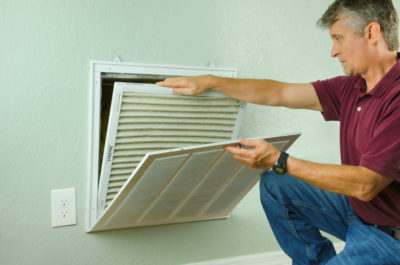“Abe's Heating and cooling were professional and on time. they helped me with two time sensitive projects and did excellent work. I know who I'll be calling if I should ever need an HVAC technician.”
Blog
 When it’s time to replace your home’s AC filter, it’s not as simple as just grabbing the right size. There are several different types of air conditioning filters, each with its own set of pros and cons.
When it’s time to replace your home’s AC filter, it’s not as simple as just grabbing the right size. There are several different types of air conditioning filters, each with its own set of pros and cons.
Air conditioning filters play a massive role in determining the air quality in your home. They filter out particles of varying sizes, depending on their Minimum Efficiency Reporting Value (MERV) rating.
Installing efficient AC filters in your home is especially important if anyone in your family has allergies or breathing problems.
Keep reading to learn about the different kinds of filters and which one is best for your home.
Although all filters serve the same basic purpose, they aren’t all created equally. Their efficiency depends on what materials they’re made from and how they’re constructed.
Spun glass AC filters are a popular option because they are very affordable. As the name suggests, these filters are made from strands of glass that have been spun together.
These strands are given structure and reinforcement from a metal grate, but they cannot filter particles smaller than three microns. This means they are only good for filtering dust, pollen, and carpet fibers.
Pleated air filters are constructed from pleated polyester or cotton. The pleated pattern gives the filter more surface area to filter with. But it can be a balancing act finding the ideal number of pleats to maximize efficiency without restricting airflow.
These filters are more effective than spun glass filters and filter out smaller particles, including pet dander and mold spores. However, they also come with a slightly higher price tag.
HEPA filters are one of the most effective filter options, making them a popular choice for people with respiratory problems. They filter out particles as small as 0.3 microns, meaning they eliminate 99.97% of airborne particles present in the air.
UV light filters excel at killing viruses, bacteria, and mold spores, but they do little for small particles like pollen. That’s why UV light filters are usually used in conjunction with another filtering system.
Media filters work similarly to pleated filters, with the pleating adding more surface area. These filters are a common choice because they require very little maintenance and have a long lifespan.
Electrostatic filters trap pollutants in a carbon filter by using static electricity as a magnet. This might sound like a wild theory, but they’re actually very effective filters. They are also an affordable option, especially since there are reusable varieties.
Some of the above AC filters come in washable options. Although they cost more than disposable filters upfront, they can be used over and over again. They are a good choice for people who would like to save money.
For a reliable, professional opinion on which filter is best for your home, contact the experts at ABE Heating and Cooling. We are located in Brighton, Colorado, and serve the entire Denver Metro Area.